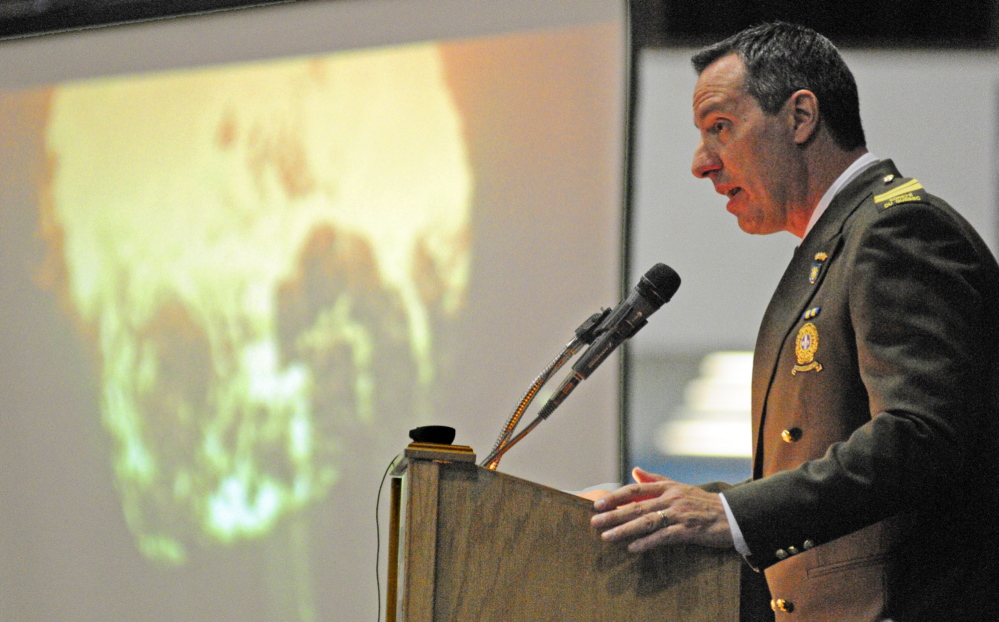AUGUSTA — Tim Hardy was asleep in his camp at 3:30 a.m. on July 6 when he got the call from a customs official at Maine’s border with Quebec: A major train derailment and explosion had happened in Lac-Megantic, 30 miles over the border.
Hardy, director of the Franklin County Emergency Management Agency and Farmington’s assistant fire chief, left with other firefighters in a tower truck and pickup truck just before 5 a.m. for the popular tourist town, not knowing what to expect. Seven other departments from the area responded. Border guards waved them through at the Coburn Gore crossing.
Approaching the town, the Farmington firefighters saw a massive smoke plume billowing from Lac-Megantic. When they got to town, they saw leveled buildings. Hardy described it as a “war zone.”
Hardy was a member of a four-person panel Wednesday at the Augusta Civic Center on authorities’ response to the derailment of the unattended runaway train carrying crude oil, which sparked a fire and explosion that killed 47 people and destroyed 40 buildings.
He was joined on the panel at the Maine Partners in Emergency Preparedness Conference by Canadian officials who responded: Lt. Daniel Campagna, the top provincial police official in the area surrounding the town; Capt. Rene Cayer, emergency management operations coordinator for Quebec police; and Jean Savard, a planning chief for the Quebec Ministry of Public Security.
The panelists said their international mutual aid arrangements, authorized by a 1999 compact between northeastern states and the eastern Canadian provinces, were essential to responding to the crisis.
“When there’s a human disaster or a human crisis, the border doesn’t exist,” Campagna said.
Maine departments, from towns including Rangeley, Phillips, Strong and Eustis, sent 45 firefighters to Lac-Megantic for more than a full day of work. Ladder trucks from Rangeley and Farmington got water on train cars still filled with oil, keeping them from exploding.
There were some problems in responding, Hardy said.
It was hard to communicate with responders at the scene while on the way to the town, and Hardy said he and his fellow firefighters didn’t speak French, Quebec’s official language, and it took awhile to find an English-speaking first responder to translate in Lac-Megantic.
Hardy said he has since identified local residents who speak French and could go with responders to Quebec if needed in the future.
The disaster has sparked calls for further railroad regulation on both sides of the border. Rangeley Fire Chief Tim Pellerin was in Washington, D.C., this month to testify before a U.S. Senate committee at Maine Sen. Susan Collins’ invitation.
He called for increased training for departments that may be called to respond to incidents involving transportation of hazardous materials, among other things.
The Federal Railroad Administration proposed a rule change this month to require two-person crews on trains carrying crude oil and establish crew size standards for freight and passenger rail.
Also Wednesday, the Canadian government announced that it will phase out the types of tanker train cars that exploded in Lac-Megantic. DOT-111 tank cars account for about 70 percent of all tankers on the North American rails, but are prone to rupture, often splitting open like soda cans after derailment, according to The Associated Press.
But the Canadian and American officials in Augusta on Wednesday said the mutual aid arrangements worked in response to the Lac-Megantic crisis. That’s of particular importance to Maine, which has lots of rural rail carrying crude oil.
Michael Shepherd can be contacted at 370-7652 or at:
mshepherd@centralmaine.com
Twitter: @mikeshepherdme
Send questions/comments to the editors.


